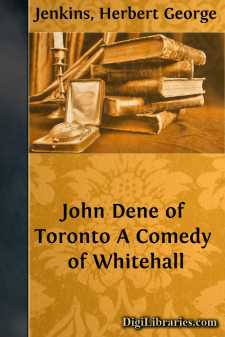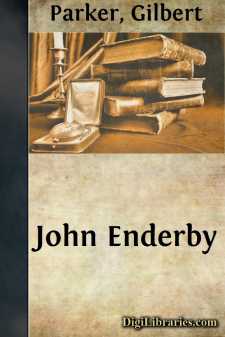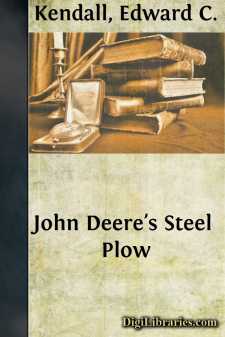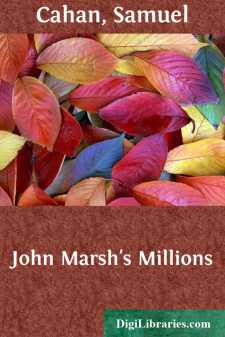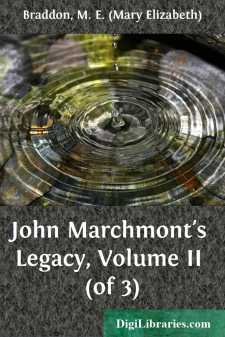Fiction
- Action & Adventure 180
- Biographical 15
- Christian 59
- Classics
- Coming of Age 5
- Contemporary Women 3
- Erotica 8
- Espionage/Intrigue 12
- Fairy Tales, Folklore & Mythology 236
- Family Life 169
- Fantasy 117
- Gay 1
- General 596
- Ghost 32
- Historical 808
- Horror 43
- Humorous 160
- Jewish 25
- Legal 4
- Medical 22
- Mystery & Detective 315
- Political 49
- Psychological 41
- Religious 64
- Romance 159
- Sagas 11
- Science Fiction 730
- Sea Stories 113
- Short Stories (single author) 537
- Sports 10
- Suspense 1
- Technological 8
- Thrillers 2
- Urban Life 31
- Visionary & Metaphysical 1
- War & Military 173
- Westerns 199
Classics Books
Sort by:
CHAPTER I THE COMING OF JOHN DENE "Straight along, down the steps, bear to the left and you'll find the Admiralty on the opposite side of the way." John Dene thanked the policeman, gave the cigar in his mouth a twist with his tongue, and walked along Lower Regent Street towards Waterloo Place. At the bottom of the Duke of York's steps, he crossed the road, turned to the left and...
more...
by:
Gilbert Parker
I Of all the good men that Lincolnshire gave to England to make her proud, strong and handsome, none was stronger, prouder and more handsome than John Enderby, whom King Charles made a knight against his will. "Your gracious Majesty," said John Enderby, when the King was come to Boston town on the business of draining the Holland fen and other matters more important and more secret,...
more...
CHAPTER I. EARLY LIFE AND CALL TO THE MINISTRY, 1505-1547. On the sixteenth day of January, 1546, George Wishart delivered a remarkable sermon in the church of Haddington. Two things had combined to produce special depression in his heart. Shortly before he entered the pulpit a boy had put into his hands a letter informing him that his friends in Kyle would not be able to keep an appointment which they...
more...
John Deere in 1837 invented a plow that could be used successfully in the sticky, root-filled soil of the prairie. It was called a steel plow. Actually, it appears that only the cutting edge, the share, on the first Deere plows was steel. The moldboard was smoothly ground wrought iron. Deere's invention succeeded because, as the durable steel share of the plow cut through the heavy earth, the...
more...
CHAPTER I. CAPTAIN ARUNDEL'S REVENGE. Edward Arundel went back to his lonely home with a settled purpose in his mind. He would leave Lincolnshire,—and immediately. He had no motive for remaining. It may be, indeed, that he had a strong motive for going away from the neighbourhood of Lawford Grange. There was a lurking danger in the close vicinage of that pleasant, old-fashioned country mansion,...
more...
CHAPTER I. THE MAN WITH THE BANNER. The history of Edward Arundel, second son of Christopher Arundel Dangerfield Arundel, of Dangerfield Park, Devonshire, began on a certain dark winter's night upon which the lad, still a schoolboy, went with his cousin, Martin Mostyn, to witness a blank-verse tragedy at one of the London theatres. There are few men who, looking back at the long story of their...
more...
by:
Samuel Cahan
CHAPTER I. When John Marsh, the steel man, died, there was considerable stir in the inner circles of New York society. And no wonder. The wealthy ironmaster's unexpected demise certainly created a most awkward situation. It meant nothing less than the social rehabilitation of a certain individual who, up to this time, had been openly snubbed, not to say deliberately "cut" by everybody in...
more...
CHAPTER I. MARY'S LETTER. It was past twelve o'clock when Edward Arundel strolled into the dining-room. The windows were open, and the scent of the mignionette upon the terrace was blown in upon the warm summer breeze. Mrs. Marchmont was sitting at one end of the long table, reading a newspaper. She looked up as Edward entered the room. She was pale, but not much paler than usual. The...
more...
HISTORY OF SKI-ING Very little is known of the early history of Ski-ing. Doctor Henry Hoek in his book "Der Schi" gives a very interesting chapter tracing the use of Skis back to the earliest records. He thinks that Skis were used by Central Asian races thousands of years B.C. and long before they were used in Europe. According to his book the word "Schi" is derived from the Gothic...
more...
by:
Kelly Freas
"People are basically alike," Harding said democratically. He sat idly against the strawlike matting of the hut wall and reached for a native fruit in a nearby bowl. "They're all suckers, even the smartest of them; in fact, the ones who think they're the smartest generally wind up to be the dumbest." Carefully, he bit into the fruit which resembled an orange and, mouth full,...
more...


